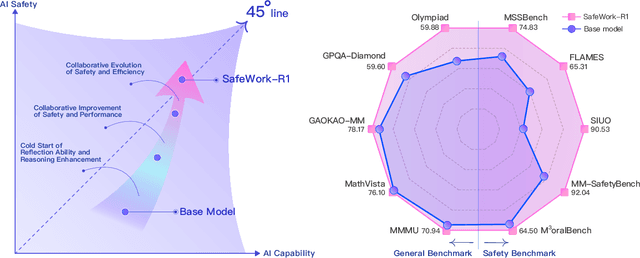Fenghua Weng
SafeWork-R1: Coevolving Safety and Intelligence under the AI-45$^{\circ}$ Law
Jul 24, 2025



Abstract:We introduce SafeWork-R1, a cutting-edge multimodal reasoning model that demonstrates the coevolution of capabilities and safety. It is developed by our proposed SafeLadder framework, which incorporates large-scale, progressive, safety-oriented reinforcement learning post-training, supported by a suite of multi-principled verifiers. Unlike previous alignment methods such as RLHF that simply learn human preferences, SafeLadder enables SafeWork-R1 to develop intrinsic safety reasoning and self-reflection abilities, giving rise to safety `aha' moments. Notably, SafeWork-R1 achieves an average improvement of $46.54\%$ over its base model Qwen2.5-VL-72B on safety-related benchmarks without compromising general capabilities, and delivers state-of-the-art safety performance compared to leading proprietary models such as GPT-4.1 and Claude Opus 4. To further bolster its reliability, we implement two distinct inference-time intervention methods and a deliberative search mechanism, enforcing step-level verification. Finally, we further develop SafeWork-R1-InternVL3-78B, SafeWork-R1-DeepSeek-70B, and SafeWork-R1-Qwen2.5VL-7B. All resulting models demonstrate that safety and capability can co-evolve synergistically, highlighting the generalizability of our framework in building robust, reliable, and trustworthy general-purpose AI.
DELMAN: Dynamic Defense Against Large Language Model Jailbreaking with Model Editing
Feb 17, 2025Abstract:Large Language Models (LLMs) are widely applied in decision making, but their deployment is threatened by jailbreak attacks, where adversarial users manipulate model behavior to bypass safety measures. Existing defense mechanisms, such as safety fine-tuning and model editing, either require extensive parameter modifications or lack precision, leading to performance degradation on general tasks, which is unsuitable to post-deployment safety alignment. To address these challenges, we propose DELMAN (Dynamic Editing for LLMs JAilbreak DefeNse), a novel approach leveraging direct model editing for precise, dynamic protection against jailbreak attacks. DELMAN directly updates a minimal set of relevant parameters to neutralize harmful behaviors while preserving the model's utility. To avoid triggering a safe response in benign context, we incorporate KL-divergence regularization to ensure the updated model remains consistent with the original model when processing benign queries. Experimental results demonstrate that DELMAN outperforms baseline methods in mitigating jailbreak attacks while preserving the model's utility, and adapts seamlessly to new attack instances, providing a practical and efficient solution for post-deployment model protection.
 Add to Chrome
Add to Chrome Add to Firefox
Add to Firefox Add to Edge
Add to Edge